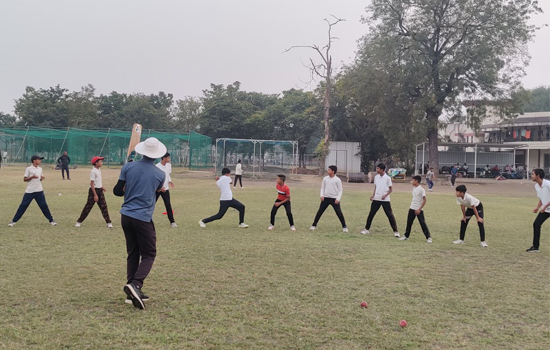
For every Olympian soaring on the podium, or the professional athlete captivating thousands, there's an intricate network of professionals working tirelessly behind the scenes. A Bachelor of Physical Education (B.P.Ed) opens doors to diverse career opportunities within the dynamic sports industry. This comprehensive guide aims to illuminate the journey from pursuing a B.P.Ed to navigating the vast landscape of sports-related careers. From the halls of Bachelor of Physical Education and Sports Colleges to the steps leading to a Master's degree, discover the roadmap to a fulfilling career in sports.
A Bachelor of Physical Education program encompasses a multifaceted curriculum, covering areas such as sports science, physiology, nutrition, kinesiology, psychology, and coaching techniques. This diverse course not only emphasizes theoretical knowledge but also provides ample opportunities for practical learning through internships, sports events, and hands-on experience. Graduates emerge equipped with essential skills like leadership, communication, teamwork, and critical thinking, vital in the sports industry's competitive landscape.
Contrary to popular belief, a Bachelor in Physical Education opens doors to far more than just teaching gym class. The dynamic nature of the field equips you with a diverse skill set applicable to various sectors within the sports industry. Let's explore some exciting career paths: The career prospects post-B.P.Ed are wide-ranging. Graduates can pursue roles as physical education teachers, sports coaches, fitness trainers, sports administrators, or pursue further specialization in sports psychology, nutrition, or management. Networking, gaining practical experience through internships, and continuously upgrading skills are crucial for a successful career trajectory in the sports industry.
Inspire and guide athletes at various levels, from grassroots programs to professional teams. Your expertise in training techniques, biomechanics, and sports psychology will be invaluable in shaping future champions.
Navigate the business side of sports, managing teams, organizing events, and securing sponsorship's. Your understanding of the athletic world combined with business acumen will be key to driving success.
Contribute to the smooth functioning of sporting organizations, from managing facilities to overseeing event logistics. Your organizational skills and problem-solving abilities will be crucial in ensuring efficient operations.
Become the voice of the game! Work as a sports journalist, commentator, or broadcaster, captivating audiences with your knowledge and passion for the sport. Your strong communication skills and analytical mind will be your assets. This is just a glimpse into the diverse career landscape. With a Bachelor in Physical Education, you can also explore research, rehabilitation, sports marketing, and even venture into entrepreneurship, creating your own unique path in the industry.
Choosing the right college for a B.P.Ed is pivotal. Reputable institutions offer state-of-the-art facilities, experienced faculty, and robust internship programs. Factors such as faculty expertise, infrastructure, alumni network, industry connections, and internships should guide your decision when selecting the ideal college.
Prepare for a well-rounded education encompassing sports pedagogy, exercise physiology, anatomy and kinesiology, biomechanics, nutrition, and psychology. You'll also delve into coaching methods, sports administration, and first aid, gaining a holistic understanding of the field.
Get hands-on experience through practical sessions, workshops, and internships. Learn to coach different sports, assess fitness levels, develop training programs, and manage sporting events.
As a future professional in the field, maintaining your own physical fitness is crucial. Expect engaging physical activities and training throughout your course.
Connect with fellow students, coaches, and industry professionals. "Bachelor of physical education and sports colleges" foster a strong sense of community, providing valuable networking opportunities for your future career.
For those seeking to further specialize, a Master's degree in physical education can be a valuable next step. A Master's degree in Physical Education provides an edge in the competitive job market. It offers specialized knowledge, advanced skills, and the potential for higher earnings.Pursuing a Master's degree can lead to roles in sports research, higher education, sports medicine, and specialized coaching positions. It allows you to:
Choose a specific area of focus, such as sports coaching, exercise science, or sports management, gaining advanced theoretical and practical expertise.
A Master's degree can unlock access to senior-level positions and open doors to research or academic careers.
The sports industry is constantly evolving. A Master's degree ensures you stay updated on the latest trends and research, giving you a competitive edge. Pursuing a Bachelor in Physical Education requires dedication, perseverance, and a genuine passion for sports. Be prepared for challenging coursework, demanding physical activity, and long hours during practical sessions. However, the rewards are numerous, including::
For those seeking to further specialize, a Master's degree in physical education can be a valuable next step. A Master's degree in Physical Education provides an edge in the competitive job market. It offers specialized knowledge, advanced skills, and the potential for higher earnings.Pursuing a Master's degree can lead to roles in sports research, higher education, sports medicine, and specialized coaching positions. It allows you to:
As a coach, trainer, or administrator, you'll have the opportunity to positively impact the lives of athletes and promote healthy lifestyles.
The diverse career paths within the sports industry allow you to tailor your professional journey to your specific interests
A Bachelor of Physical Education acts as a launching pad into a vibrant world of career possibilities within sports. Selecting the right college, gaining hands-on experience, and considering further education through a Master's degree significantly augment career prospects. Whether shaping future athletes or contributing to sports science, a B.P.Ed journey brims with opportunities for those passionate about sports and fitness.